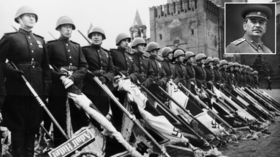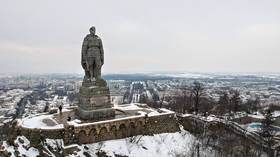For all the talk of 'Stalin's successes,' the Soviet Union smashed the Nazis in spite of his harsh leadership, not because of it

In politics, nothing is sacred, least of all the past. World War Two is no exception, and hard truths about how Nazi Germany was crushed have been a frequent target for those misunderstanding or even seeking to rewrite history.
A recent example has been a Twitter controversy caused by Professor Asatar Bair who has tried to make the case for, in his words, Stalin’s “successes as a leader,” in particular with respect to the Soviet-German war of 1941-1945.
Here’s why that’s completely mistaken. As in upside-down wrong. And how that’s an error with a long, dark history that needs to end already.
Also on rt.com Soviets worked with West to bring down Nazi legacy – but now NATO expansion risks tearing Europe apart once again, Putin saysFirst, it is important to make a clear distinction: the question of Stalin’s contribution (or not) to the victory over fascism in World War II is not at all the same as that of which country made the single greatest contribution to this outcome. That question has long had a very clear answer: it is impossible to dispute that it was the Soviet Union which ripped the heart out of fascism’s mid-20th century efforts to form a brutal Eurasian empire. Both in terms of the sacrifices its people made and the scale of German military losses its armies inflicted, the USSR was crucial to smashing the Third Reich.
That Soviet victory was all the more striking given that, in the first months of the invasion – codenamed Operation Barbarossa – things went very badly for the Soviet side. And yet, between the Battle of Moscow in the winter of 1941 and the Battle of Kursk, two years later, everything had changed.
Snatching victory from the jaws of defeat, by 1945, the Red Army was hoisting the hammer and sickle over Berlin. Adolf Hitler’s forces, who had fought with tremendous cruelty to establish an ethnically cleansed slave empire in what the Germans then termed “the East,” were not only defeated but wiped off the map.
However, in the Cold War-era West, historical memory stopped short of fully acknowledging the USSR’s role in this victory. It was inconvenient in more than one way. Did it mean that the Soviet system and its values, even in its Stalinist form, could triumph over a capitalist economy like the Third Reich’s? Did the grim determination of the country to win the war despite all odds show that its economy, wasteful as it was, could be a formidable force when mobilized for war? And was the Soviet Union still a force to be reckoned with were a putative war to break out with the West?
Western bias led to absurd stereotypes, still often regurgitated, featuring “primitive” Soviet soldiers dragooned into battle at every step, against their will, by machine-gun-toting NKVD troops. In more than one Western account of the Battle of Stalingrad, where the Soviets turned the tide of the war and struck a blow for the Allies on all fronts, more empathy has been lavished on the Germans than the Soviets.
In mainstream popular culture, a mix of denial and amnesia mostly prevailed. During the wartime alliance with the Soviet Union, it was Hollywood that made some of the most disingenuous pro-Stalinist propaganda movies of all times – such as 1943’s ‘The North Star’ and ‘Mission to Moscow’. But by 1962, a big-budget, all-star feature like ‘The Longest Day’ was focusing on the Western front instead. By exclusively elevating the 1944 D-Day landings in France, the film left a strong – and historically misleading – impression that they had been the real turning-point of the war, more than two years after the decisive Battle of Stalingrad. It was produced with massive support from several NATO states and their militaries.
Yet Western Cold War warriors were not the only ones who rewrote history. So did Stalin and his sympathizers, including some Western communists. In essence, their story was simple: the victory over Nazi Germany – the greatest and most life-or-death triumph not only in Soviet but Russian history – was Stalin’s work.
Also on rt.com Victory Day belongs to the Russian people: Westerners must realize it celebrates destroying the Nazis, not honoring Stalin’s USSRHis genius, so this great-man-makes-history-on-steroids tale goes, saved the homeland, defeated fascism, and secured unprecedented international power for the Soviet Union. The contribution of normal people who suffered in factories and on the front line was greatly downplayed, most egregiously by massively deflating the number of Soviet casualties.
The communist leader, in reality, did what he could – which was a lot – to steal a personal victory from the Soviet Union’s population. When the war was finally over, a combined total of about 27 million civilians and soldiers lay dead, and that was only a part of the general devastation. They faced a government that became one horrendous disappointment. Instead of continuing the (relative) liberalization measures of wartime, the authorities tightened the screws again. Instead of truly honoring the dead and those whose bodies and souls were scarred forever by horror and loss, it told the survivors to fawn over Stalin’s wise strategies.
This lie did not survive for long after Stalin’s death. In his very public “Secret Speech” of 1956, Khrushchev attacked not only some of his predecessor’s domestic repressions, but also his record as a war leader. As with Khrushchev’s approach to revising the former leader’s reputation in general, the criticism was incomplete and contradictory. But the gist was clear – Stalin was dethroned as military genius and even blamed for the abysmal cost of the victory.
And rightly so. Stalin’s mistakes before and during the war against Nazi Germany were terrible and too numerous to be fully spelled out. Perhaps the single most bizarre instance was his initial disbelief towards the scores of credible warnings of the German attack. But there was more: Stalin decimated the Soviet officer corps in his prewar purges, thereby psychologically hobbling those who were left. He meddled in military questions he did not understand, such as how best to deploy tanks. In international politics, he bizarrely misinterpreted the Spanish Civil War as, most of all, yet another place to fight the shadow of Trotskyism. And, moreover, he was decisive in the insane Comintern policy of targeting other socialists as “social fascists,” thereby sabotaging broad anti-fascist coalitions until it was too late.
During the first trying days of collapse and rout that followed the start of Nazi Blitzkrieg against the Soviet Union, Stalin almost gave up. He retreated to one of his dachas and, apparently, expected his inner circle to remove, punish, and quite likely kill him. Yet, instead, they asked him to return to the helm, which he did. After that though, he continued to meddle in military decisions, creating more costly mistakes.
But, over time, he also seems to have done one thing that his chief opponent Hitler signally failed to do. Stalin came to tacitly accept the expertise of generals who knew better than he did, as long as they were politically submissive and provided he could claim the laurels of victory. That is very little to say in his defense, and there really isn’t much else to add to his credit – even if some historians, both in the West and the former Soviet Union, have said otherwise. They risk committing the fallacy of mistaking archival evidence supporting the fact Stalin was there to lead for proof that he was “indispensable” to the war effort. Remaining at the helm and steering the ship in the right direction are two very different skills.
Unfortunately, more than half a century after Khrushchev’s “Secret” Speech, some have still not caught up with historical reality, in Russia and elsewhere. No, Stalin cannot be redeemed by the claim that he made an important contribution to the victory over fascism. The Soviet people did that, as the greatest novelist of the war, Vasily Grossman, stressed.
The communist leader, if anything, made it only harder and costlier. And on top of all that, he then tried to deprive them of the memory of their enormous sacrifice and their historic achievement. If you still want to credit Stalin for winning the war, you perpetuate his lie.
If you like this story, share it with a friend!
The statements, views and opinions expressed in this column are solely those of the author and do not necessarily represent those of RT.
The statements, views and opinions expressed in this column are solely those of the author and do not necessarily represent those of RT.















